| Srl | Item |
| 1 |
ID:
151397
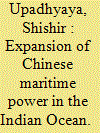

|
|
|
|
|
| Summary/Abstract |
This paper examines the ongoing expansion of China’s maritime power in the Indian Ocean region and analyses its potential impact on the extant balance of Sino-Indian maritime power in the region. It posits that the expanding Chinese maritime power in the Indian Ocean could seriously challenge India’s geostrategic advantage in the near future and that India can no longer take for granted its strategic location at the centre of the Indian Ocean nor the strength of its historical ties with the various regional states. It further argues that the current Indian maritime strategy for the Indian Ocean region, to be the “net security provider” for the entire region, is unsustainable and thus needs to be reviewed and rebuilt leveraging the geographic advantage enjoyed by India over China in the Indian Ocean.
|
|
|
|
|
|
|
|
|
|
|
|
|
|
|
|
| 2 |
ID:
140955
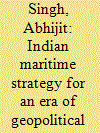

|
|
|
|
|
| Summary/Abstract |
The fractious nature of maritime relations in the Asia-Pacific region is a recognisable feature of international geopolitics today. Following China’s massive reclamation and ‘island-building’ project in the South China Sea recently, many Pacific states have moved to bolster their maritime postures. While Japan has sought legislative amendments to liberate its maritime posture from post-war passivism, Vietnam and the Philippines have been building stronger navies aimed at countering China’s hostile moves in the South China Sea. Meanwhile, Indonesia has sought to renew its capabilities as a maritime power through a new ‘maritime axis’ strategy, while Australia has boldly advocated an ‘Indo-Pacific’ framework for joint security endeavours and the creation of ‘middle-power coalitions’. In the interim, Russia has updated its maritime doctrine, announcing its military partnership with China as the cornerstone of its naval strategy in the Pacific.
|
|
|
|
|
|
|
|
|
|
|
|
|
|
|
|
| 3 |
ID:
144403
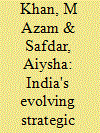

|
|
|
| 4 |
ID:
162497
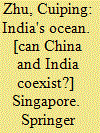

|
|
|
|
|
| Publication |
Singapore, Springer Nature, 2018.
|
| Description |
ix, 193p.hbk
|
| Series |
Research Series on the Chinese Dream and China's Development Path
|
| Standard Number |
9789811057250
|
|
|
|
|
|
|
|
|
|
|
|
Copies: C:1/I:0,R:0,Q:0
Circulation
| Accession# | Call# | Current Location | Status | Policy | Location |
| 059558 | 327.51054/ZHU 059558 | Main | On Shelf | General | |
|
|
|
|
| 5 |
ID:
132142
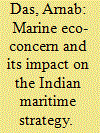

|
|
|
|
|
| Publication |
2014.
|
| Summary/Abstract |
Maritime strategic planning cannot be done in isolation of marine eco-concerns. Marine species are known to perceive the environment around them through acoustic signals, and depend on sound for numerous functions like foraging, communication and navigation. Noise as a pollutant has found scant reference in the United Nations Environmental Programme (UNEP) document of 1982-the United Nations Convention on the Laws of the Seas (UNCLOS). The International Maritime Organization (IMO) is yet to include noise as a pollutant in its 1978 MARPOL Convention. The enthusiasm for so-called economic growth and related activities in the absence of a regulatory framework encourages indiscriminate rise in such activities and the resultant increase in the anthropogenic noise, with disastrous impact on the acoustic habitat. A more inclusive maritime strategy is thus called for. In this article, the author presents a unique dimension for Indian maritime strategy.
|
|
|
|
|
|
|
|
|
|
|
|
|
|
|
|
| 6 |
ID:
104097
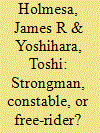

|
|
|
|
|
| Publication |
2009.
|
| Summary/Abstract |
Many scholars assume that the European model of realpolitik will prevail in Asia as the dual rise of China and India reorders regional politics. Others predict that Asia's China-centric tradition of hierarchy will reassert itself. But Indians look as much to nineteenth-century U.S. history as to any European or Asian model. Indeed, successive prime ministers explicitly cited the Monroe Doctrine to justify intervention in hotspots around the Indian periphery. But the Monroe Doctrine underwent several phases during America's rise to world power. These phases can help South Asia analysts project possible futures for Indian maritime strategy.
|
|
|
|
|
|
|
|
|
|
|
|
|
|
|
|